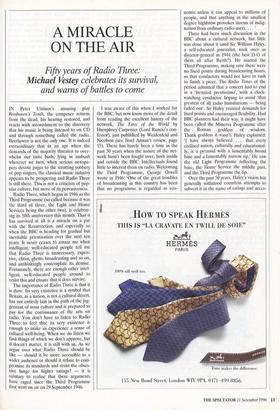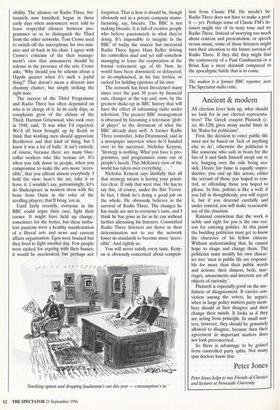A MIRACLE ON THE AIR
Fifty years of Radio Three: Michael Vestey celebrates its survival, and warns of battles to come IN Peter Ustinov's amusing play Beethoven's Tenth, the composer returns from the dead, his hearing restored, and reacts with astonishment to the discovery that his music is being listened to on CD and through something called the radio. Beethoven is not the only one. It is indeed extraordinary that in an age when the demands of the majority threaten to over- whelm our taste buds, lying in ambush wherever we turn, when serious newspa- pers devote pages to the strutting yobbery of pop singers, the classical music industry appears to be prospering and Radio Three is still there. This is not a criticism of pop- ular culture, but more of its pervasiveness.
Radio Three, which began in 1946 as the Third Programme (so called because it was the third of three, the Light and Home Services being the other two), is celebrat- ing its 50th anniversary this month. That it has survived at all is a miracle on a par with the Resurrection, and especially so when the BBC is heading for gradual but inevitable privatisation over the next ten years. It never ceases to amaze me when intelligent, well-educated people tell me that Radio Three is unnecessary, expen- sive, elitist, ghetto broadcasting and so on, and unthinkingly contemplate its demise. Fortunately, there are enough other intel- ligent, well-educated people around to resist this and ensure that it does survive.
The importance of Radio Three is that it is there. Its very existence is a symbol that Britain, as a nation, is not a cultural desert, has not entirely lain in the path of the jug- gernaut of mass culture and is prepared to pay for the continuance of the arts on radio. You don't have to listen to Radio Three to feel this; its very existence is enough to make us experience a sense of cultural well-being. When we do listen we find things of which we don't approve, but it doesn't matter, it is still with us. As we argue over what Radio Three should be like — should it be more accessible to a wider audience or should it refuse to com- promise its standards and resist the obses- sive lunge for higher ratings? — it is salutary to realise that these arguments have raged since the Third Programme first went on air on 29 September 1946. I was aware of this when I worked for the BBC, but now know more of the detail from reading the excellent history of the network, The Envy of the World by Humphrey Carpenter (Lord Runcie's con- fessor), just published by Weidenfeld and Nicolson (see Noel Annan's review, page 15). There has barely been a time in the past 50 years when the nature of the net- work hasn't been fought over, both inside and outside the BBC. Intellectuals found little to interest them on radio. Welcoming the Third Programme, George Orwell wrote in 1946: 'One of the great troubles of broadcasting in this country has been that no programme is regarded as eco- nomic unless it can appeal to millions of people, and that anything in the smallest degree highbrow provokes storms of indig- nation from ordinary radio-users.... ' There had been much discussion in the BBC about a cultural network, but little was done about it until Sir William Haley, a self-educated journalist, took over as director-general in 1944 (the best D-G of them all after Reith?). He started the Third Programme, making sure there were no fixed points during broadcasting hours, so that conductors would not have to rush to finish a piece. The Radio Times of the period admitted that a concert had to end in a `frenzied prestissimo', with a clock- watching conductor hoping to avoid 'that greatest of all radio humiliations — being faded out'. So Haley resisted demands for fixed points and encouraged flexibility. Had BBC planners had their way, it might have been called the Minerva Programme after the Roman goddess of wisdom. Thank goddess it wasn't. Haley explained: '1 have always believed ... that every civilised nation, culturally and educational- ly, is a pyramid with a lamentably broad base and a lamentably narrow tip.' He saw the old Light Programme reflecting the base, the Home Service the middle part, and the Third Programme the tip.
Over the past 50 years, Haley's vision has generally withstood countless attempts to subvert it in the name of ratings and acces-
sibility. The silences on Radio Three, for- tunately now banished, began in those early days when announcers were told to leave respectful silences between pro- grammes so as to distinguish the Third from the other networks. Tom Crowe used to switch off the microphone for two min- utes and sit back in his chair. I agree with Crowe's criticism of the then manage- ment's view that announcers should be solemn in the presence of the arts. Crowe asks, 'Why should you be solemn about a Haydn quartet when it's such a joyful thing?' That doesn't mean a descent into chummy chatter, but simply striking the right note.
The success of the Third Programme and Radio Three has often depended on who is in charge of it. In its early days, as complaints grew of the elitism of the Third, Harman Grisewood, who took over in 1948, said, 'It was what I'd expected. We'd all been brought up by Reith to think that working men should appreciate Beethoven and that kind of thing, but I knew it was a lot of balls.' It isn't entirely, of course, because there are many blue- collar workers who like serious art. It's when you talk down to people, when you compromise to make the arts more 'acces- sible', that you affront almost everybody. I hold the view: here's the art, take it or leave it. I wouldn't say, patronisingly, let's do Shakespeare in modern dress with the brats from Oasis in the roles of the strolling players; that'll bring 'em in.
Until fairly recently, everyone in the BBC could argue their case, fight their corner. It might have held up change, sometimes for the better, but these turbu- lent passions were a healthy manifestation of a liberal arts and news and current affairs organisation. Egos were bruised but they lived to fight another day. Few people were sacked for arguing with their bosses; it would be overlooked, but perhaps not forgotten. That is how it should be, though obviously not in a private company manu- facturing, say, biscuits. The BBC is not making biscuits. It is full of creative people who believe passionately in what they're doing. It's impossible to imagine in the BBC of today the sincere but mercurial Radio Three figure Hans Keller driving his controllers mad and yet still somehow managing to leave the corporation at the formal retirement age of 60. Now, he would have been downsized, or delayered, or de-emphasised, in his late forties, or sacked for holding opinions of his own. The network has been threatened many times over the past 50 years by financial cuts, changes at the top and, now, by the greatest shake-up in BBC history that will have the effect of subsuming radio under television. The present BBC management is obsessed by becoming a television 'glob- al player' to the detriment of what the BBC already does well. A former Radio Three controller, John Drummond, said in a newspaper interview when he'd handed over to his successor, Nicholas Kenyon, 'Strategy is nothing. What you have is pro- grammes, and programmes come out of people's heads. This McKinsey view of the world has taken over everything.... ' Nicholas Kenyon says dutifully that all that strategy means is having your priori- ties clear. If only that were true. He has to say this, of course, under the Birt Terror. In fact, I think he's doing a good job on the whole. He obviously believes in the survival of Radio Three. The changes he has made are not to everyone's taste, and I think he has gone as far as he can without further alienating his listeners. Committed Radio Three listeners are fierce in their determination not to see the network lower its standards to become more 'acces- sible'. And rightly so.
You will never satisfy every taste. Keny- on is obviously concerned about competi-
`Smoking opium and dropping laudanum's out this year — consumption's in.'
tion from Classic FM. He needn't be: Radio Three does not have to make a prof- it — yet. Perhaps some of Classic FM's lis- teners might tire of its maty tone and try Radio Three. Instead of worrying too much about content and presentation, or speech versus music, some of those listeners might turn their attention to the future survival of Radio Three. If they did, they might find the controversy of a Paul Gambaccini or a Brian Kay a mere skirmish compared to the apocalyptic battle that is to come.
The author is a former BBC reporter, now The Spectator radio critic.



















































































 Previous page
Previous page